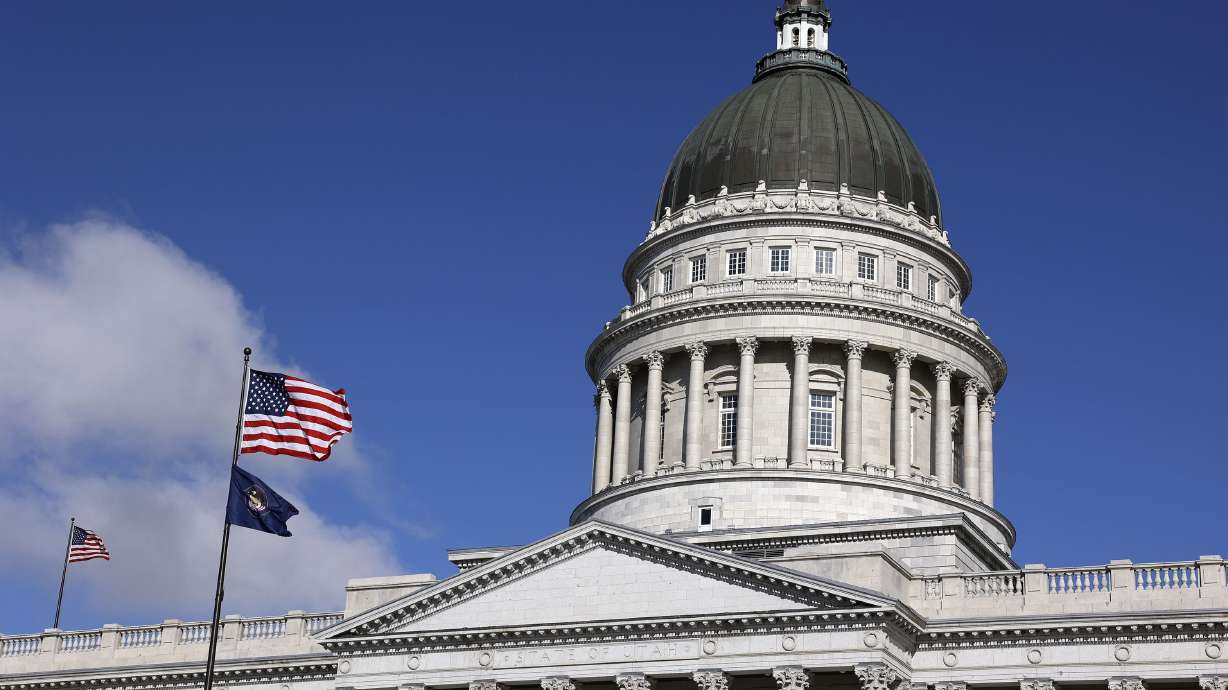Estimated read time: 4-5 minutes
This archived news story is available only for your personal, non-commercial use. Information in the story may be outdated or superseded by additional information. Reading or replaying the story in its archived form does not constitute a republication of the story.
SALT LAKE CITY — Water conservation, infrastructure and public education are set to receive landmark funding this year as lawmakers approved the budget on Friday.
"I think we're dealing with the largest budget we've ever dealt with since state history," said Senate Budget Chairman Jerry Stevenson, R-Layton, as the Executive Appropriations Committee met at the Capitol.
The Utah Legislature had over $2 billion extra money to spend this year after new revenue estimates added an extra $432 million in one-time revenue and $384 million in ongoing funds than what was previously expected. The total amount available to spend this year now includes $1.46 billion in one-time money and $570 million in ongoing new money.
Stevenson told reporters Friday this year brought a more difficult budget session than usual.
"Because there was a lot of money, but there's a lot of confusion on how much money we really had because of the (American Rescue Plan Act) funds and the restrictions on how we could spend that," he said, explaining that funds need to be returned if not used as outlined by the federal government.
Last week, House leaders warned the money still isn't enough to fund the $2.5 billion in one-time requests and over $1 billion in ongoing requests by lawmakers.
What did get approved in the budget Friday included another $168.7 million in ongoing money and about $270.9 million in one-time funds for public education, intended for numerous projects including $12.2 million for optional full-day kindergarten.
The budget marks a 9% increase over last year in public education spending, Senate leaders noted.
Natural resources, agriculture and environmental quality projects will receive $50.6 million ongoing money and $464.9 million in one-time money — much of which will filter toward water projects. That includes $200 million one-time funding for secondary water metering; $30 million one-time money for Utah Lake preservation; $25 million one-time for rural drinking water projects; and $60 million one-time for the Bear Lake Marina expansion.
During a news conference on Friday, House Speaker Brad Wilson, R-Kaysville, said the Legislature will continue discussions about a constitutional amendment for budget earmarks, but not this session.
"We don't have a lack of money, we have a lack of budget flexibility. It's going to need to be addressed," he said. "As is often the case, sometimes you just run out of time. And we felt like we're getting up against the clock."
Wilson said the Legislature's approved budget will address "many needs of the state," and reiterated that leaders don't plan to use this year's surplus to fund ongoing programs amid concerns of future economic stress.
He acknowledged that the conflict in Ukraine could have unforeseen consequences on Utah's economy, and wants to guard against any "economic turbulence."
"My personal opinion is that if this doesn't get resolved in a peaceful way soon, it will affect our state's financial situation in the future," Wilson said, adding that the budget will set aside some money previously allocated to ongoing projects to prepare for that possibility.
Lawmakers have already budgeted $193 million for tax cuts, including $163 million for an across-the-board income tax rate cut for all Utahns, dropping Utah's income tax rate from 4.95% to 4.85%. Lawmakers also approved a $15 million nonrefundable earned income tax credit targeted for lower-income Utahns and a $15 million expansion for the state's Social Security tax credit.
"Strategic and prudent planning is the Utah way," Senate President Stuart Adams said in a statement after the budget received approval.
"Our frugal budgeting paved the way for our state to cut taxes for the second year in a row and fund priority budget items like education, infrastructure, water conservation and social service programs at substantial levels. Not only are we funding these items, but we are also saving money to ensure our children and grandchildren have the same or better quality of life than we enjoy. While Utah is in a strong financial position, we will continue to make fiscally conservative decisions to ensure we remain an economic leader for our nation," he said.
Some other budget highlights include:
- About $55 million in one-time funds for "deeply" affordable housing projects.
- Amid what lawmakers have described as a mental health crisis among first responders, $5 million one-time funds will help pay for mental health programs for first responders and their families.
- $12 million ongoing money for film incentives to attract productions to the state.
- $91 million one-time funds for public education capital and technology.
- Resources for the homeless population, including $55 million in one-time money to establish the COVID-19 Homeless Housing and Services Grant Program. and $3.5 million in one-time money to increase teen centers for students experiencing homelessness.
- $21 million to expand broadband access across the state.
- More than $55 million to fund police and correctional officer pay.
- $3 million for an electric vehicle charging infrastructure in rural Utah.
- $38 million for improved access to outdoor recreation and state parks.
Contributing: Bridger Beal-Cvetko









